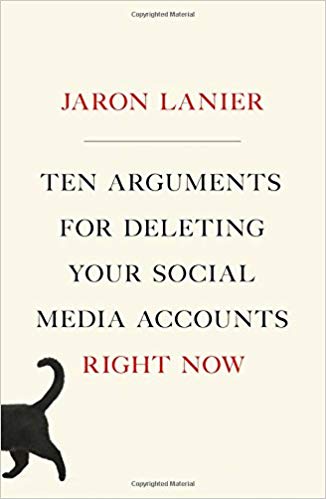Jaron Lanier’s Ten Arguments for Deleting Your Social Media Accounts Right Now is a solid set of thinking on the topic (published about a year ago). And Lanier says that he knows of further reasons that he could have included.
Essentially, Lanier is recommending people step away from social media and look at what it has created in us as individuals and in our larger society. And then decide for ourselves how we want it to work. That is a tough call collectively, as these services have become heavily intertwined in how many of us operate. That said, I don’t think it would cause the fall of society if these service vanished - as they most likely will, to be replaced by something else. And I think Lanier would like to see the “something else” be better designed to remove the issues he recounts.
So what are the arguments? He dedicates a chapter to each topic, so it is pretty quick to see the high level ideas. Of course, each has several components - both the negative and the positive aspects of the argument. Clearly, all of them are geared toward highlighting the issues he sees with the way today’s social media is being used. A number of these topics are familiar from current news reporting, and others dive into topics that are more nuanced. (I’m not detracting from the book - the arguments are published directly on the book website along with Lanier’s further writings around the topic.)
You are losing your free will. It’s well-argued that these sites can manipulate what you see, based on statistics about what others respond to. And it is all about making money off advertising, since these services are all “free” to the users.
Quitting social media is the most finely targeted way to resist the insanity of our times. I appreciate that Lanier acknowledges that there are many good things about the internet and our ability to connect in general. It’s just the way these particular services go about thigns that are so frustrating that quitting them is the obvious way to force a change.
Social media is making you an asshole. It’s easier to be an idiot without contextual and social queues that human beings use all the time.
Social media is undermining the truth. Fake news becomes real news. And dubious science is held in the high regard.
Social media is making what you say meaningless. One voice drown in a sea. And the fake news thing.
Social media is destroying your capacity for empathy. Again, humans relate to each other, but without social queues and more of the story, it is easier for us to lose empathy for one another. In particular, being stuck in an echo chamber makes it hard to appreciate what others have to say. I also thought of the idea that we can never truly know what is happening with people, and when filtered through the kinds of algorithms Lanier describes, it is even more difficult to understand - to empathize.
Social media is making you unhappy. This chapter made me sad, though I don’t know if the challenge is as big as this statement. Yes, the algorithms employed are reinforcing strong (usually negative) feelings. But just not responding should help. I think I am no longer the target audience for these algorithms.
Social media doesn’t want you to have economic dignity. An interesting argument stemming from the early days of the internet and social media, but I’m not sure I followed the whole idea.
Social media is making politics impossible. As with many of the above topics, entrenched communities get further entrenched (and reinforced by bad actors who know how to use the system). All making it very difficult to have the nuanced conversations required of positive politics.
Social media hates your soul. For some reason I think of Andre the Giant and The Dread Pirate Roberts is here for your soul when I read this topic.
